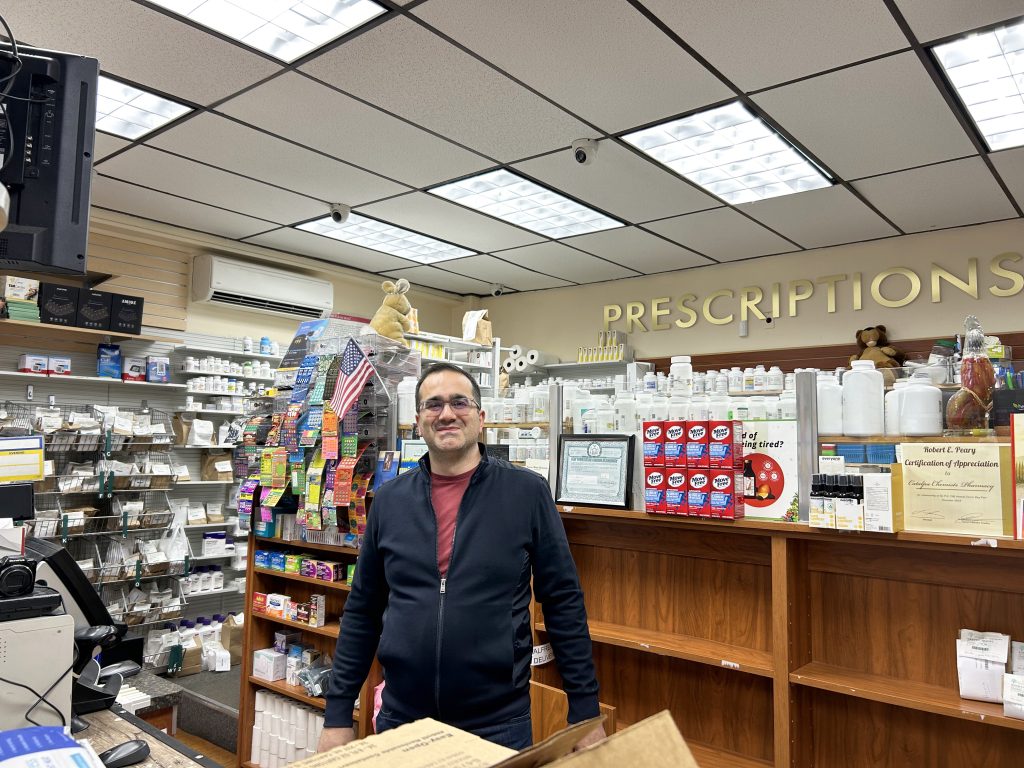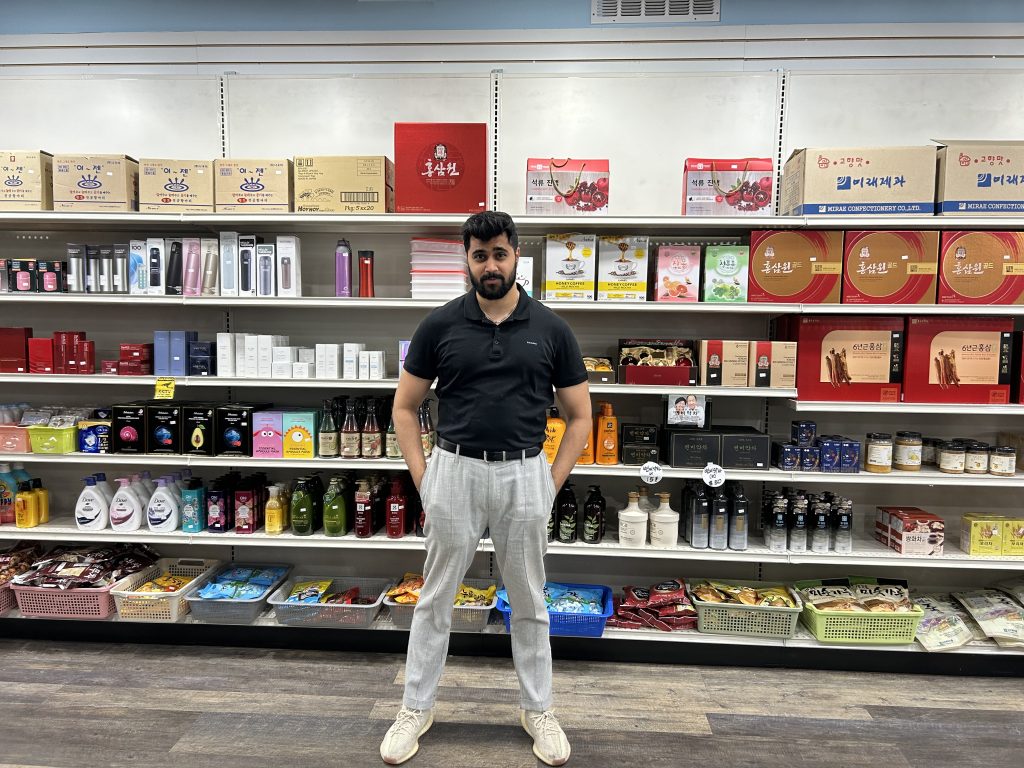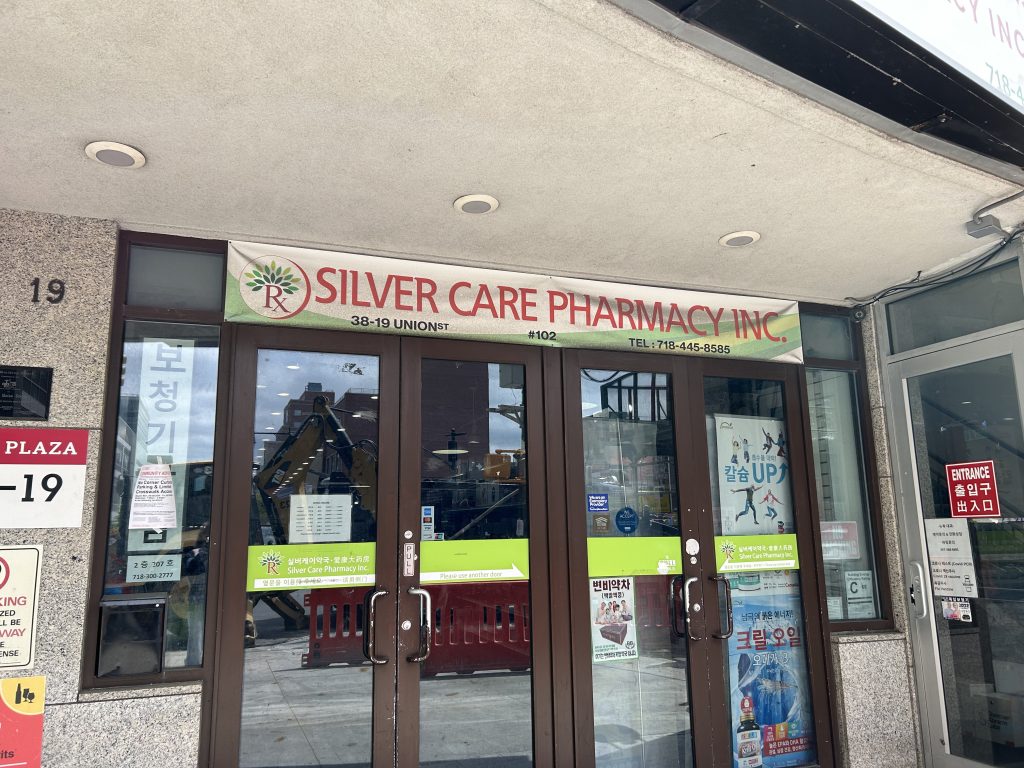By Alexandra Byrne

Gary Normatov stands behind the prescriptions desk of Catalpa Chemists, the pharmacy he has owned in Ridgewood, Queens since 2016. Image by Alexandra Byrne. May 4, 2024.
Across Queens, chain pharmacies like Walgreens and Rite Aid are closing, sending customers to one of the borough’s 600+ independently-owned options. So why are local pharmacies struggling to make ends meet? Owners say insurance intermediaries called Pharmacy Benefit Managers (PBMs) are to blame.
PBMs are pushing customers to mail order or chain pharmacies that PBMs themselves own. When customers do stay local, PBMs shortchange the pharmacy, reimbursing less than what they charge customers.
Yury Tsadyk, owner of Big Six Pharmacy, an independent pharmacy in Woodside, says he loses money on about one third of prescriptions he fills.
“Sometimes patients get frustrated at the pharmacies, because they take it out on us,” Tsadyk said. “… the insurance companies control it, we have no say in that. But we establish good relationships with the patients, give all the possible service we can just to have volume.”
Tsadyk isn’t the only one. Joel Kurzman, the director of State Government Affairs at the National Community Pharmacists Association, says local pharmacies across the country are closing due to a lack of PBM regulation.
The top three PBMs control about 80 percent of the market, Kurzman said, and they control each step of the process. CVS Health Corporation, for instance, owns CVS pharmacies; CVS Caremark, a PBM; and Aetna, a major insurance provider.
“PBMs are exceedingly powerful in the negotiation of contracts with pharmacies,” Kurzman said. “They offer ‘take it or leave it’ contracts where the PBMs dictate the terms. The walk-away for pharmacies is that you’re not going to be able to stay in business if you don’t abide by the terms. I don’t think it’s really a negotiation at all.”
On May 1, Kurzman sent a memo to the New York State Department of Financial Services outlining a solution that gives the consumer the power to choose which pharmacy is best for them. New York State has been aware of the issue since at least 2019, when a senate committee determined PBMs manipulate drug prices “to enhance their own profits at the expense of plans and its members.”
That investigation, led by upstate Senator James Scoufis, found that PBMs have “strained the contemporary healthcare system.”
“Initially created to control drug costs and manage prescription claims, PBMs have grown and consolidated so that only a handful of near-monopolies with limited accountability dominate the drug market,” the committee wrote, adding that PBMs wield “power to affect the price of pharmaceuticals being paid by consumers and the State.”
Following that report, the state senate passed legislation in late 2021 regulating PBMs and requiring they provide the government with financial information. Since then, however, ongoing negotiations over specific regulations have cut back the strength of the bill, said Leigh McConchie, President of the Pharmacists Society of the State of New York. Notably, McConchie said a payment floor—a minimum amount PBMs would have to pay pharmacies—was removed from the legislation and unions would be exempt from the changes.
McConchie and Kurzman both said PBMs have immense lobbying power, allowing them to stymie or avoid complying with legislative efforts. In the meantime, local pharmacies take losses in order to care for their patients.

At Silver Care Pharmacy in Flushing, Queens, Haseeb Shah says his patients come first, even if he loses money on their prescription. Image by Alexandra Byrne. May 3, 2024
“We have lost a lot of business,” said Haseeb Shah, who owns Silver Care Pharmacy in Flushing. “A lot of pharmacies lose money on certain products. We do too, but we’re willing to accept those losses just to help out the patient. I’m a businessman, but I’m a pharmacist first. For me, making sure we can take care of patients — that’s what’s important.”
Gary Normatov, the owner of Catalpa Chemists in Ridgewood, agreed.
“There’s not much you can do — if your patient needs something, you’ve got to give it to them,” Normatov said. “You’re hoping in the end you’re not losing money. It’s like gambling. It’s not the way it should be.”
In addition to losing money, Normatov is losing patients to mail order. In one instance, he filled a patient’s prescription for two months after a hospital stay before his insurance pushed him to a mail order pharmacy. For Normatov, mail order poses risks, like improper storage and lost medications.
“Mail order is part of a bigger picture of patient steering,” Kurzman explained. “Patient steering is when a PBM prevents a patient from using a pharmacy of their choice and they’re steered, either through incentives or requirements, to use a pharmacy dictated by the PBM.”
Shah expressed a similar frustration.
“There needs to be more transparency — they’re steering business to themselves and that’s not fair for us,” Shah said.

Silver Care Pharmacy in Flushing, Queens. There are roughly 2,000 local pharmacies across New York City. Image by Alexandra Byrne. May 3, 2024.
In the face of challenges with PBMs, each owner emphasized that local pharmacies offer a level of care and service patients can’t get elsewhere. For some pharmacies like Nature’s Way Pharmacy in Ridgewood, pharmacist technician Luz Perez said she’s seen business increase, with customers coming from Walgreens, in particular. Unlike other pharmacies in Queens, Perez said she hasn’t seen many customers leaving for mail order. She says customers are also attracted to the pharmacy’s offerings of natural and organic products.
“A lot of them say that we’re really friendly, they have a lot of issues getting their medications, they don’t have a lot of compassion for them, and so they switch to the small business because we can give them that one-on-one attention they need,” Perez explained. “At big businesses, they just want you in-and-out.”
During the pandemic, local pharmacies were crucial in maintaining community health. Now, owners are urging their communities to not forget that as they confront the challenges PBMs pose.
“We love them, we take care of them,” Normatov said. “We were there for them all throughout COVID … We love it, this is what we do. This is why I became a pharmacist.”


